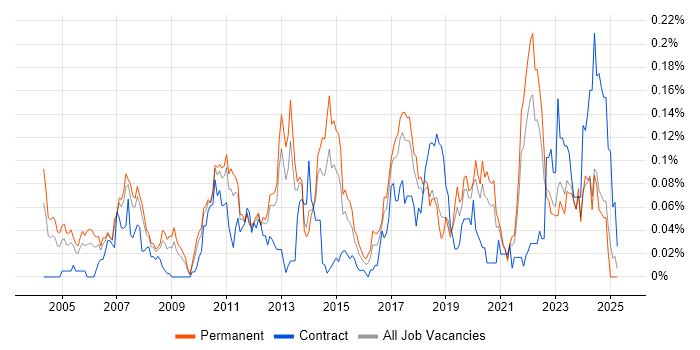Distributed Computing
England > North of England
The table below looks at the prevalence of the term Distributed Computing in permanent job vacancies in the North of England. Included is a benchmarking guide to the salaries offered in vacancies that cited Distributed Computing over the 6 months leading up to 7 November 2025, comparing them to the same period in the previous two years.
| 6 months to 7 Nov 2025 |
Same period 2024 | Same period 2023 | |
|---|---|---|---|
| Rank | 279 | 288 | 281 |
| Rank change year-on-year | +9 | -7 | +155 |
| Permanent jobs citing Distributed Computing | 2 | 9 | 6 |
| As % of all permanent jobs in the North of England | 0.021% | 0.072% | 0.078% |
| As % of the Miscellaneous category | 0.062% | 0.26% | 0.21% |
| Number of salaries quoted | 2 | 9 | 4 |
| 10th Percentile | £58,500 | - | £59,875 |
| 25th Percentile | £60,000 | £47,500 | £67,188 |
| Median annual salary (50th Percentile) | £65,000 | £50,000 | £72,500 |
| Median % change year-on-year | +30.00% | -31.03% | -54.69% |
| 75th Percentile | £70,000 | £52,500 | £73,750 |
| 90th Percentile | £71,500 | £57,500 | - |
| England median annual salary | £77,500 | £92,500 | £85,000 |
| % change year-on-year | -16.22% | +8.82% | +3.03% |
All Generic Skills
North of England
Distributed Computing falls under the General and Transferable Skills category. For comparison with the information above, the following table provides summary statistics for all permanent job vacancies requiring generic IT skills in the North of England.
| Permanent vacancies with a requirement for generic IT skills | 3,239 | 3,410 | 2,912 |
| As % of all permanent jobs advertised in the North of England | 33.78% | 27.31% | 37.89% |
| Number of salaries quoted | 1,669 | 1,419 | 2,130 |
| 10th Percentile | £26,000 | £31,250 | £31,475 |
| 25th Percentile | £31,250 | £41,250 | £42,500 |
| Median annual salary (50th Percentile) | £47,500 | £52,500 | £55,440 |
| Median % change year-on-year | -9.52% | -5.30% | +0.80% |
| 75th Percentile | £65,000 | £65,000 | £70,000 |
| 90th Percentile | £80,000 | £80,000 | £85,000 |
| England median annual salary | £54,987 | £60,000 | £62,500 |
| % change year-on-year | -8.36% | -4.00% | -0.79% |
Distributed Computing
Job Vacancy Trend in the North of England
Historical trend showing the proportion of permanent IT job postings citing Distributed Computing relative to all permanent IT jobs advertised in the North of England.

Distributed Computing
Salary Trend in the North of England
Salary distribution trend for jobs in the North of England citing Distributed Computing.

Distributed Computing
Job Locations in the North of England
The table below looks at the demand and provides a guide to the median salaries quoted in IT jobs citing Distributed Computing within the North of England region over the 6 months to 7 November 2025. The 'Rank Change' column provides an indication of the change in demand within each location based on the same 6 month period last year.
| Location | Rank Change on Same Period Last Year |
Matching Permanent IT Job Ads |
Median Salary Past 6 Months |
Median Salary % Change on Same Period Last Year |
Live Jobs |
|---|---|---|---|---|---|
| North West | +16 | 2 | £65,000 | +30.00% | 11 |
| Distributed Computing England |
|||||
Distributed Computing
Co-Occurring Skills & Capabilities in the North of England by Category
The following tables expand on the one above by listing co-occurrences grouped by category. They cover the same employment type, locality and period, with up to 20 co-occurrences shown in each category:
